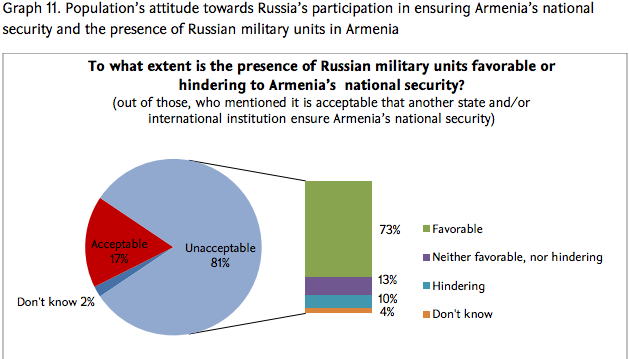 Tatul Hakobyan (r.), Manvel Sargsyan (c.), Vladimir Karapetyan (l.)
Tatul Hakobyan (r.), Manvel Sargsyan (c.), Vladimir Karapetyan (l.)
The Civilitas Foundation organized a public discussion Tuesday on the topic of “National Security and Foreign Military Bases in Armenia,” with keynote speakers Manvel Sargsyan, Director of the Armenian Center for National and International Studies and Vladimir Karapetyan, Head of the Committee on International Relations of the ANC party.
The discussion was held at the Armenian Center for Contemporary Experimental Art (NPAK).
The speakers discussed the findings of a survey conducted by the Civilitas Foundation about the Armenian public’s perception of national security and the presence of foreign military bases in Armenia.
The survey was conducted by the Civilitas Foundation in March 2015. It was done over phone calls with 600 residents of Armenia, randomly selected from all the regions of the country.
 The polling showed that the overwhelming majority of Armenia’s population (81%) thinks it is unacceptable for another state and/or an international structure to ensure Armenia’s national security. This view is different, however, when it comes to the population’s attitudes towards the presence of military units.
The polling showed that the overwhelming majority of Armenia’s population (81%) thinks it is unacceptable for another state and/or an international structure to ensure Armenia’s national security. This view is different, however, when it comes to the population’s attitudes towards the presence of military units.
The telephone poll included questions aimed at identifying the population’s level of tolerance towards foreign military units in Armenia, to what extent these units can contribute to ensuring Armenia’s national security and under which conditions is the Armenian population ready to provide its territory for the deployment of foreign military units. 55 percent of the population found it acceptable that another state’s or international (intergovernmental) institution’s military base be deployed in Armenia.
 This survey follows a June 2014 Civilitas poll which showed that the public agrees with the Armenian authorities’ justification for joining the Customs Union (later the Eurasian Economic Union), saying the decision is more linked to “security reasons” than to economic factors. This raised the question of the public’s perception of “national security” and to what extent public expectations of national security match the current policy of deploying foreign military bases in Armenia.
This survey follows a June 2014 Civilitas poll which showed that the public agrees with the Armenian authorities’ justification for joining the Customs Union (later the Eurasian Economic Union), saying the decision is more linked to “security reasons” than to economic factors. This raised the question of the public’s perception of “national security” and to what extent public expectations of national security match the current policy of deploying foreign military bases in Armenia.
The Tuesday discussion opened with the following question: “Are we condemned to always have a Russian presence on the territory of Armenia?” to which Karapetyan responded “I believe not.” He went on to say that Armenia has no alternative today for the presence of foreign soldiers, but he is certain that upon the resolution of the Nagorno-Karabakh conflict and the regulation of Armenian-Turkish relations that “there will no longer be any foreign soldier on our soil.”
There are presently about 3,000 Russian soldiers officially deployed at the 102nd Military Base located in Gyumri, close to the Armenian-Turkish border. There are other Russian border guard units deployed along the Armenian-Turkish and Armenian-Iranian state borders.
“Are we condemned to always have a Russian presence on the territory of Armenia?”
When asked if he foresees any issues arising from this military presence, Sargsyan replied “Unfortunately we, as Armenians, don’t have any influence or leverage over the situation.” He proceeded to bring up the fact that the Russians were arming Azerbaijan, with Armenian authorities justifying it by claiming it is “pure business.”
“When we associate our hopes of safety and security with foreign people and foreign entities, we can never be sure what their unilateral decisions might be,” Sargsyan added.
















